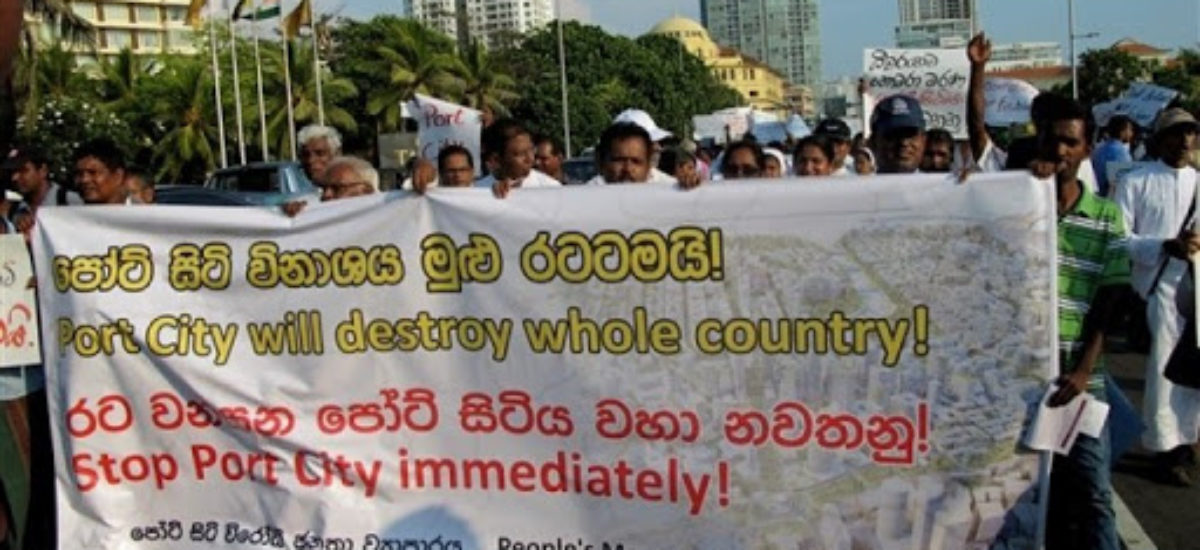Photo courtesy of Asia News
Aluth avurudu is generally a relaxed period in the country where most people spend time with family following various traditions. But the SLPP/Rajapaksa Administration upended this situation and in the pre-avurudu period just as people were getting ready for the holidays, introduced a slew of measures, policy initiatives and draft legislation that were wide ranging in scope and breathtaking in audacity.
Firstly, as an Administration that made national security a political issue, to deal with the criticism that it had failed to identify, let alone bring to book the masterminds behind the Easter Sunday attacks, the Minister in charge of the subject claimed that a suspect in custody was in fact the mastermind behind the whole plot. The government then expanded the PTA to create special “rehabilitation centers” sans any due process safeguards for alleged extremists and followed these up with the proscription of about 12 organizations, allegedly involved in extremism, with extremism of course not being defined. The response to these initiatives was a few days coming but when it did was quite severe. Speaking at a ceremony unveiling a monument dedicated to victims of the attack, Cardinal Malcom Ranjith claimed that the attacks were the result of political rather than religious extremism. The Cardinal stated that the “Easter Sunday attack was not a result of a craze over religion but an attempt to capture and safeguard power”. These words were conceptually in line with what opposition front benchers in the SJB have been alleging.
The issue however that blew up in the face of the government was its proposed Port City Special Economic Zone Bill that was also gazetted on the eve of the holidays. The Bill, which seeks to provide the legal framework for the management of the Port City, creates essentially a semi if not fully autonomous enclave that exempts the Port City and its near self-governing Commission, from most of the laws of the land, thereby essentially becoming a law unto itself. The proposed Port City Commission would more or less single handedly decide on all matters within the Port City Zone, with no checks and balances or oversight. The powers devolved to the Provincial Council under the 13th amendment are inconsequential compared to the sweeping powers and exemption from most laws granted to the Port City Commission. Despite the holidays, the response to the audacious proposal was swift and more importantly quite widespread.
Leading the charge was the main opposition Samagi Jana Balawegaya (SJB), which through its General Secretary Ranjith Madduma Bandara and MP Harshana Rajakaruna, filed action in the Supreme Court against the proposed Bill. Similarly, the JVP and even the single seat rump UNP filed action in the Apex Court. The reactions and response of civil society was also swift in coming. The Bar Association through its newly elected executive filed action in Court as did over a dozen trade unions, including those affiliated to political parties that are constituents of the SLPP’s governing alliance. The Supreme Court actions are however necessarily limited in scope to the constitutionality of the proposed Bill; it does not examine the policy or political decisions behind the proposals. That is a job for democratic dialogue and the political and civil society discourse both within Parliament and outside it.
This article does not seek to examine the legal or constitutional aspects of the proposed Bill, which will be argued before the Apex Court, but rather the political ramifications of the policy and the serious dissent in society to the government’s proposals for Port City autonomy. It is hoped that the Speaker, who has in recent times come in for stinging criticism from the Opposition benches for alleged partiality, will realize that not accommodating political dialogue, diversity and dissent within the democratic structures only tends to drive such dissent from political institutions to the streets, as we have seen both in Sri Lanka in the past, when governments have had super majorities and sought to shut out opposition within parliament. The same has been the case in other Asian countries – Myanmar, Hong Kong and Thailand being some recent examples
In that context, it is quite concerning that the government’s response to the public opposition to its proposed legislation is to explore laws to control social media, the one avenue of free expression that is now vibrant and not within the shade and shadow of the ruling alliance. The SLPP/Rajapaksa Administration would do well to remember the lessons of its previous political overreach in proposed legislation of the Divi Neguma Bill, which was successfully challenged in Court and the presiding Chief Justice consequently sacked, but with a straight line from that course of political follies to the government’s popularity decline and electoral defeat in 2015.
Internal dissent is always a greater political peril to a government than external opposition. Both the previous Mahinda Rajapaksa Administration and its successor the Sirisena Administration came a cropper and lost their re-elections because of serious internal dissent that led to internal divisions and resulted in electoral defeat. Therefore it must be of serious concern to even dissenters and the Administration’s apex leadership when serious dissent on policy and political issues arises within the governing alliance, which they are then not disposed of to deal with through consultation and policy adjustments. Leading the internal charge against the proposed Port City Bill was former Justice Minister and current SLPP back bencher Wijeydasa Rajapakshe, who in a widely covered press conference from a well-known temple in the city’s suburbs that had been a cradle for the Rajapakse political comeback effort since 2015, launched a stinging criticism of the proposed special economic zone. Prelates and lay leaders were also associated with his views. While a lot of the public discussion has been on the government’s reaction to its parliamentary member’s allegations, the more important policy imperatives are the issues that he has raised so publicly.
The opposition to the proposed Port City Bill is widespread and how the government deals with it, democratically as it should or autocratically as it is often tempted to, would have significant impact in the future on these important aspects of our national life.


